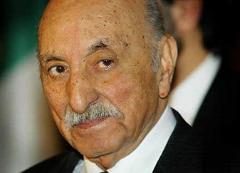for former Afghan King Mohammed Zahir Shah,
when approaching it through the leafy Roman
neighborhood of Olgiata, is that it is the only
property in the area completely devoid of trees.
Less noticeable are the Uzi-wielding guards,
the floodlights that illuminate the area after
dusk and the helicopters that make periodic
passes overhead, but they all point to the
same theme: concerns over the frail monarch's
safety.
"Trees are nice to look at but they are also easy
to hide in," said Sgt. Paolo Pettiti, a member of
Zahir Shah's security detail stationed outside the house and who, even while talking, scanned the
horizon for potential dangers. "Here, we do not take chances."
Behind the high walls, the large cement-colored house is more utilitarian than comfortable. It has
been Zahir Shah's home since he was overthrown in a coup led by a cousin in the summer of 1973,
but his aides say the former king has always seen it as temporary, until he could return to his
homeland.
That goal is finally within view. Zahir Shah's long-awaited return to Kabul is drawing near, and
when he arrives he will play what will probably be his last hand in trying to bring peace by a
country torn by war for more than two decades.
Zahir Shah has no designs on returning to the throne he held for 40 years. Indeed, he has thrown his
support behind Afghanistan's interim leader, Hamid Karzai, whose father was a friend of the ex-
king's. But as the former monarch who will return as a kingmaker, his role is a key one. He is
revered by many in Afghanistan, where his reign is seen as the last period of tranquility that the
hapless country experienced, and, as a result, the former king's support adds much-needed
legitimacy to Karzai's fragile coalition. Furthermore, he is the only figure who can call the loya jirga,
the traditional tribal council that will decide on the structure of the Afghan government that will
take over when Karzai's mandate expires around mid year.
"In many ways, the role of Zahir Shah in post-Taliban Afghanistan is more important than anyone
else's, even Karzai's," said Mohamed Al-Rwi, a Rome author specializing in central Asian history.
"He is a unifying figure, a loved figure, a respected figure. Most importantly, he is the only part of
the equation that cannot be replaced."
Zahir Shah is 87, and his health is a natural concern, but aides say security is a much bigger worry.
Original plans were for the ex-king to return to Kabul no later than today, start of the Afghan holy
year called Nowrus -- a tradition outlawed under the country's former hard-line Taliban rulers --
but those plans have been pushed back to Tuesday because of security fears.
Additionally, the former king has declined almost all interviews, speaking instead through members
of his inner circle of advisers, a response to a 1991 assassination attempt by a man posing as a
journalist.
"His majesty spends his time in contemplation and in preparing for his return to Kabul," said
Hamid Sidig, an adviser to the former king. "His security is the responsibility of advisers
experienced in this area, and they have chosen a very conservative strategy."
When Zahir Shah finally leaves his Roman villa to return to Afghanistan, it will at first be to a
special house built for him outside Kabul. But, according to Yamah Mojadedi, another adviser, the
former king hopes to eventually return to Arg, the sandstone palace of domes and pillars the ex-
monarch once called home. Arg has been partially destroyed by bombings that started with the
Soviet invasion in 1979 and are still taking place in parts of the country.
Mojadedi says the former king sees himself as a "father figure" to his beleaguered countrymen, a
man with a connection to the past who can help guide the country toward what he hopes will be a
democratic and peaceful future.
When he became king in 1933, all of this seemed impossibly unlikely. His family had ruled the
country without pause since 1761, and at the age of 19, Zahir Shah took the throne and before long
he took steps to modernize what he saw as an outdated form of government. Most notably, he
wrote the country's first constitution in 1963, improved women's rights and allowed limited
governmental representation. When the government was overthrown -- while Zahir Shah was on
vacation in Italy -- most of those advances were reversed.
Since then, the former king has shied away from the spotlight, walking through the tree-lined
streets of Olgiata in a jogging suit and reading literature he never had a chance to read as king.
Educated in Europe and at home, Zahir Shah learned fluent French, English and Farsi as a youth but
he never bothered to learn Italian as an adult, despite spending most of three decades in the country.
"Certain people have a desire to die in the country where they were born," said Al-Rwi, the author.
"That may be the case with Zahir Shah, (but) he's not ready yet. The steps he can take over the
coming weeks and months can help ensure that when he does go, it will be without bombs
exploding overhead for the first time in decades. Maybe he can leave his country in peace, the way
he came into it."
© 2002 • All Rights Reserved • St. Petersburg Times
490 First Avenue South • St. Petersburg, FL 33701 • 727-893-8111
